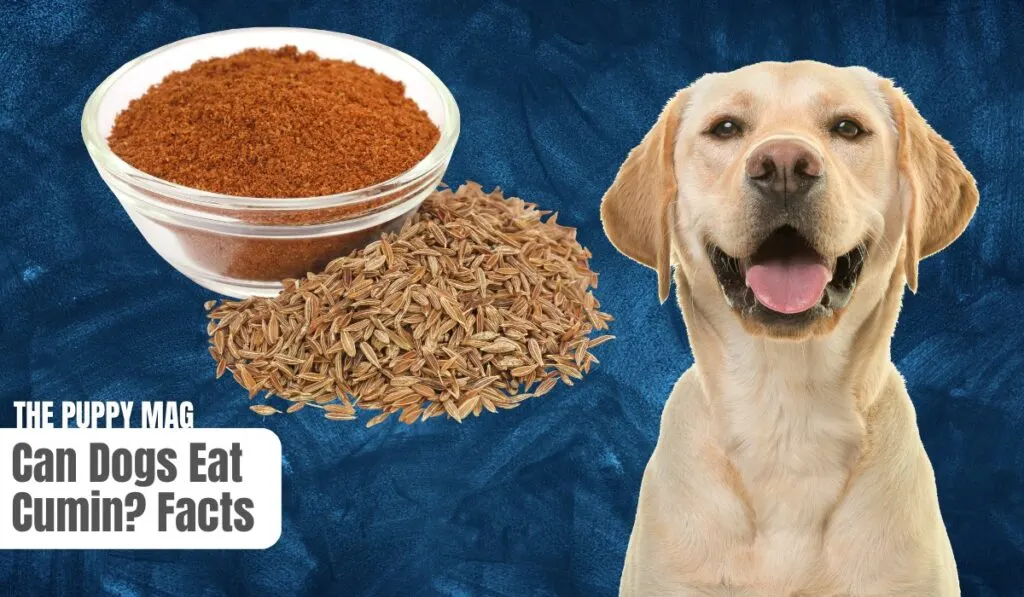As a dog owner, you want to ensure that your furry friend stays healthy and happy. One question that may come up is whether or not cumin is safe for dogs to eat.
Cumin is a popular spice that’s used in a variety of dishes, but is it safe for dogs to consume? In this article, we’ll explore the potential risks and benefits of feeding cumin to your canine companion.

Is Cumin Bad for Dogs? Understanding the Risks and Benefits
Cumin is a spice that’s commonly used in many different types of cuisine, including Indian, Mexican, and Middle Eastern.
It’s a member of the parsley family and is known for its distinct earthy, warm, and slightly bitter flavor.
While cumin can be safe for dogs in small amounts, there are potential risks to consider. Here are some of the potential risks and benefits of feeding cumin to your furry friend:
Potential Risks of Feeding Cumin to Dogs
- Allergic reactions: Dogs, like humans, can have allergic reactions to certain foods. If your dog is allergic to cumin, they may experience symptoms such as itching, swelling, hives, and even difficulty breathing.
- Gastrointestinal upset: Cumin is a spice that can irritate your dog’s stomach and cause gastrointestinal upset. This may result in vomiting, diarrhea, and abdominal pain.
- Interaction with medication: If your dog is on any medication, it’s important to check with your vet before feeding them cumin. Cumin can interact with certain medications and cause adverse reactions.
- Large quantities: Feeding your dog large quantities of cumin can cause more severe symptoms, such as tremors, seizures, and even liver damage.
Potential Benefits of Feeding Cumin to Dogs
- Anti-inflammatory properties: Cumin contains compounds that have anti-inflammatory properties. This can help reduce inflammation in your dog’s body and improve their overall health.
- Digestive aid: Cumin can also help stimulate digestion and alleviate digestive issues such as bloating, gas, and constipation.
- Antioxidant properties: Cumin contains antioxidants, which can help protect your dog’s cells from damage caused by free radicals.
- Immune booster: Cumin also contains vitamins and minerals that can help boost your dog’s immune system and keep them healthy.
Should dogs really be eating cumin?
While cumin can provide some health benefits for dogs, it’s important to consider whether it’s truly necessary to include in their diet. Dogs have different nutritional needs than humans, and it’s important to provide them with a balanced and species-appropriate diet.
Many commercial dog foods are already formulated to provide the necessary nutrients for dogs, and adding cumin may not necessarily provide any additional benefits. In fact, it may even lead to potential health risks if given in excessive amounts or if your dog has an allergic reaction.
Furthermore, cumin is not a commonly used ingredient in dog food, and there is limited research on its effects on dogs. While it may be safe in small amounts, it’s always best to err on the side of caution and consult with your vet before adding any new ingredient to your dog’s diet.
Ultimately, it’s up to the individual dog owner to decide whether or not to include cumin in their dog’s diet. If you do decide to incorporate cumin, start with small amounts and monitor your dog’s reaction closely. However, if you choose not to include it, your dog can still thrive on a well-balanced diet without any additional supplements or ingredients.
How to Safely Feed Cumin to Your Dog
If you decide to feed your dog cumin, there are a few things to keep in mind to ensure their safety:
- Start with a small amount: Start by adding just a pinch of cumin to your dog’s food and gradually increase the amount over time.
- Monitor your dog’s reaction: Watch your dog closely after feeding them cumin for the first time. If you notice any signs of an allergic reaction or gastrointestinal upset, stop giving them cumin and contact your vet.
- Use high-quality cumin: Make sure you’re using high-quality cumin that’s free of additives and preservatives.
- Avoid spicy blends: Avoid feeding your dog spice blends that contain cumin along with other hot spices like cayenne pepper or chili powder.
Frequently Asked Questions (FAQs)
- Can cumin be toxic to dogs? Feeding your dog large quantities of cumin can be toxic and cause symptoms such as tremors, seizures, and liver damage. However, small amounts of cumin are generally safe for dogs to consume.
- How much cumin can I give my dog? Start by adding just a pinch of cumin to your dog’s food and gradually increase the amount over time. The amount of cumin your dog can consume depends on their size and overall health, so it’s important to consult with your vet before adding cumin to your dog’s diet.
- Can cumin help with my dog’s digestive issues? Cumin has been shown to have digestive benefits, including helping to alleviate bloating, gas, and constipation in dogs. However, it’s important to start with small amounts and monitor your dog’s reaction.
- What should I do if my dog has an allergic reaction to cumin? If you notice any signs of an allergic reaction, such as itching, swelling, hives, or difficulty breathing, stop giving your dog cumin and contact your vet immediately.
- Can I give my dog cumin supplements? While cumin supplements may be available, it’s always best to consult with your vet before giving your dog any new supplements or medications.
Conclusion
In conclusion, cumin can be safe for dogs to consume in small amounts, but there are potential risks to consider. If you’re considering adding cumin to your dog’s diet, it’s important to start with small amounts and monitor their reaction. Additionally, it’s always a good idea to consult with your vet before making any changes to your dog’s diet or supplement routine. With proper precautions, you can safely incorporate cumin into your dog’s diet and potentially reap its health benefits.
